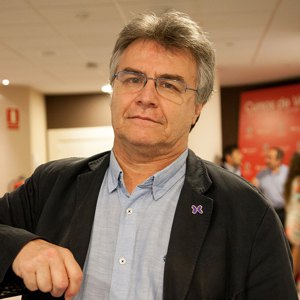At IRYCIS 6 Priority Research Areas are established and a minimum of two coordinators are assigned to each of them, with a basic mission to: i) ensure the achievement of the objectives set for their area overall; ii) guarantee communication and collaboration between the different research groups; iii) guide the emerging groups and the associate clinical researchers to achieve their progressive integration into the consolidated group level.
Neurosciences, sense organs and mental health
This is perhaps the oldest research area of the Ramón y Cajal Hospital. Since its inception, translational research in the field of Neurology and of Neurosciences general, has played a prominent role in the research activity of the hospital and currently constitutes the largest research area of IRYCIS. Being the area with the largest number of research groups, it integrates groups focused on basic research and genetic bases of neurological, neuroinflammatory and neurodegenerative diseases, sensory organ pathologies and psychiatric diseases.
Leaders

Dr. Francisco Muñoz Negrete
Jefe de servicio de Oftalmología

Dr. Javier Fernández Ruiz
Profesor Universidad Complutense de Madrid
Groups
ESCLEROSIS MÚLTIPLE
Responsable del grupo:
Luisa María Villar GuimeransNEUROLOGÍA EXPERIMENTAL
Responsable del grupo:
Luis Carlos BarrioENFERMEDADES NEURODEGENERATIVAS: Mecanismos Patogénicos
Responsable del grupo:
Manuel Guzmán PastorGENÉTICA Y PATOFISIOLOGÍA NEUROSENSORIAL
Responsable del grupo:
Miguel Ángel Moreno PelayoESCLEROSIS MÚLTIPLE
Responsable del grupo:
Luisa María Villar GuimeransNEUROLOGÍA EXPERIMENTAL
Responsable del grupo:
Luis Carlos BarrioENFERMEDADES NEURODEGENERATIVAS: Mecanismos Patogénicos
Responsable del grupo:
Manuel Guzmán PastorGENÉTICA Y PATOFISIOLOGÍA NEUROSENSORIAL
Responsable del grupo:
Miguel Ángel Moreno PelayoGENÉTICA Y PATOFISIOLOGÍA NEUROSENSORIAL
Responsable del grupo:
Miguel Ángel Moreno Pelayo
Microbiology, Immunology and Infection
Basic researchers and medical specialists are integrated to meet the common general objective of translational research in microbiology, immunology and infectious diseases. An omics approach is applied to the studies of microbial system models in order to optimize the diagnostic, therapeutic, prognostic and preventive approaches of infectious diseases. All this combined aims to improve the surveillance of health problems in the field of infection and also disease prevention.
Leaders

Dr. Francisco Muñoz Negrete
Jefe de servicio de Oftalmología

Dr. Javier Fernández Ruiz
Profesor Universidad Complutense de Madrid
Groups
ESCLEROSIS MÚLTIPLE
Responsable del grupo:
Luisa María Villar GuimeransNEUROLOGÍA EXPERIMENTAL
Responsable del grupo:
Luis Carlos BarrioENFERMEDADES NEURODEGENERATIVAS: Mecanismos Patogénicos
Responsable del grupo:
Manuel Guzmán PastorGENÉTICA Y PATOFISIOLOGÍA NEUROSENSORIAL
Responsable del grupo:
Miguel Ángel Moreno PelayoESCLEROSIS MÚLTIPLE
Responsable del grupo:
Luisa María Villar GuimeransNEUROLOGÍA EXPERIMENTAL
Responsable del grupo:
Luis Carlos BarrioENFERMEDADES NEURODEGENERATIVAS: Mecanismos Patogénicos
Responsable del grupo:
Manuel Guzmán PastorGENÉTICA Y PATOFISIOLOGÍA NEUROSENSORIAL
Responsable del grupo:
Miguel Ángel Moreno PelayoGENÉTICA Y PATOFISIOLOGÍA NEUROSENSORIAL
Responsable del grupo:
Miguel Ángel Moreno Pelayo
Cancer
With groups of significant international impact, Area 3 of IRYCIS is positioned as a centre of excellence in cancer research, with a comprehensive approach that ranges from the study of the molecular mechanisms of cancer to the development of innovative therapies and personalised strategies. Its lines of interest include the identification of biomarkers, the characterisation of tumour microenvironments, the study of the genetic and epigenetic bases of cancer, and translational research aimed at improving the diagnosis and treatment of patients. It is one of the areas of IRYCIS with the greatest presence of clinical research, concentrating the largest number of studies and clinical trials. The area's activity is developed in a collaborative environment that encourages the transfer of knowledge and participation in multicentre projects, consolidating it as a benchmark in the fight against cancer at a national and international level.
Leaders

Dr. Francisco Muñoz Negrete
Jefe de servicio de Oftalmología

Dr. Javier Fernández Ruiz
Profesor Universidad Complutense de Madrid
Groups
ESCLEROSIS MÚLTIPLE
Responsable del grupo:
Luisa María Villar GuimeransNEUROLOGÍA EXPERIMENTAL
Responsable del grupo:
Luis Carlos BarrioENFERMEDADES NEURODEGENERATIVAS: Mecanismos Patogénicos
Responsable del grupo:
Manuel Guzmán PastorGENÉTICA Y PATOFISIOLOGÍA NEUROSENSORIAL
Responsable del grupo:
Miguel Ángel Moreno PelayoESCLEROSIS MÚLTIPLE
Responsable del grupo:
Luisa María Villar GuimeransNEUROLOGÍA EXPERIMENTAL
Responsable del grupo:
Luis Carlos BarrioENFERMEDADES NEURODEGENERATIVAS: Mecanismos Patogénicos
Responsable del grupo:
Manuel Guzmán PastorGENÉTICA Y PATOFISIOLOGÍA NEUROSENSORIAL
Responsable del grupo:
Miguel Ángel Moreno PelayoGENÉTICA Y PATOFISIOLOGÍA NEUROSENSORIAL
Responsable del grupo:
Miguel Ángel Moreno Pelayo
Tools for Advanced Medicine
A common objective of this area is to generate and validate tools with clinical utility for the diagnosis, prognosis and treatment of different pathologies. The translational nature of the groups should be highlighted that allows collaborations with the majority of the Hospital's clinical services and transversal vocation backed by various collaborations with other IRYCIS groups. This is the IRYCIS area with the highest percentage of groups coming from the university.
Leaders

Dr. Francisco Muñoz Negrete
Jefe de servicio de Oftalmología

Dr. Javier Fernández Ruiz
Profesor Universidad Complutense de Madrid
Groups
ESCLEROSIS MÚLTIPLE
Responsable del grupo:
Luisa María Villar GuimeransNEUROLOGÍA EXPERIMENTAL
Responsable del grupo:
Luis Carlos BarrioENFERMEDADES NEURODEGENERATIVAS: Mecanismos Patogénicos
Responsable del grupo:
Manuel Guzmán PastorGENÉTICA Y PATOFISIOLOGÍA NEUROSENSORIAL
Responsable del grupo:
Miguel Ángel Moreno PelayoESCLEROSIS MÚLTIPLE
Responsable del grupo:
Luisa María Villar GuimeransNEUROLOGÍA EXPERIMENTAL
Responsable del grupo:
Luis Carlos BarrioENFERMEDADES NEURODEGENERATIVAS: Mecanismos Patogénicos
Responsable del grupo:
Manuel Guzmán PastorGENÉTICA Y PATOFISIOLOGÍA NEUROSENSORIAL
Responsable del grupo:
Miguel Ángel Moreno PelayoGENÉTICA Y PATOFISIOLOGÍA NEUROSENSORIAL
Responsable del grupo:
Miguel Ángel Moreno Pelayo
Chronic Pathologies and Surgery Research
Groups dedicated to different fields of biomedical research come together in Area 5 to address a broad spectrum of diseases with a high population impact and prevalence, increasingly due to sedentary lifestyles and population ageing; complex aspects of the disease, which cannot be characterised independently as they concur on most occasions in the same type of patient throughout the progression of the disease. All groups have a common denominator: the generation of clinical and translational projects with patient-centred objectives. In area 5, research is conducted on the physiopathology of cardiovascular, pneumological, multisystemic diseases, endocrine and metabolic disorders and digestive surgery.
Leaders

Dr. Francisco Muñoz Negrete
Jefe de servicio de Oftalmología

Dr. Javier Fernández Ruiz
Profesor Universidad Complutense de Madrid
Groups
ESCLEROSIS MÚLTIPLE
Responsable del grupo:
Luisa María Villar GuimeransNEUROLOGÍA EXPERIMENTAL
Responsable del grupo:
Luis Carlos BarrioENFERMEDADES NEURODEGENERATIVAS: Mecanismos Patogénicos
Responsable del grupo:
Manuel Guzmán PastorGENÉTICA Y PATOFISIOLOGÍA NEUROSENSORIAL
Responsable del grupo:
Miguel Ángel Moreno PelayoESCLEROSIS MÚLTIPLE
Responsable del grupo:
Luisa María Villar GuimeransNEUROLOGÍA EXPERIMENTAL
Responsable del grupo:
Luis Carlos BarrioENFERMEDADES NEURODEGENERATIVAS: Mecanismos Patogénicos
Responsable del grupo:
Manuel Guzmán PastorGENÉTICA Y PATOFISIOLOGÍA NEUROSENSORIAL
Responsable del grupo:
Miguel Ángel Moreno PelayoGENÉTICA Y PATOFISIOLOGÍA NEUROSENSORIAL
Responsable del grupo:
Miguel Ángel Moreno Pelayo
Epidemiology, Public Health and healthcare
Leaders

Dr. Francisco Muñoz Negrete
Jefe de servicio de Oftalmología

Dr. Javier Fernández Ruiz
Profesor Universidad Complutense de Madrid
Groups
ESCLEROSIS MÚLTIPLE
Responsable del grupo:
Luisa María Villar GuimeransNEUROLOGÍA EXPERIMENTAL
Responsable del grupo:
Luis Carlos BarrioENFERMEDADES NEURODEGENERATIVAS: Mecanismos Patogénicos
Responsable del grupo:
Manuel Guzmán PastorGENÉTICA Y PATOFISIOLOGÍA NEUROSENSORIAL
Responsable del grupo:
Miguel Ángel Moreno PelayoESCLEROSIS MÚLTIPLE
Responsable del grupo:
Luisa María Villar GuimeransNEUROLOGÍA EXPERIMENTAL
Responsable del grupo:
Luis Carlos BarrioENFERMEDADES NEURODEGENERATIVAS: Mecanismos Patogénicos
Responsable del grupo:
Manuel Guzmán PastorGENÉTICA Y PATOFISIOLOGÍA NEUROSENSORIAL
Responsable del grupo:
Miguel Ángel Moreno PelayoGENÉTICA Y PATOFISIOLOGÍA NEUROSENSORIAL
Responsable del grupo:
Miguel Ángel Moreno Pelayo
